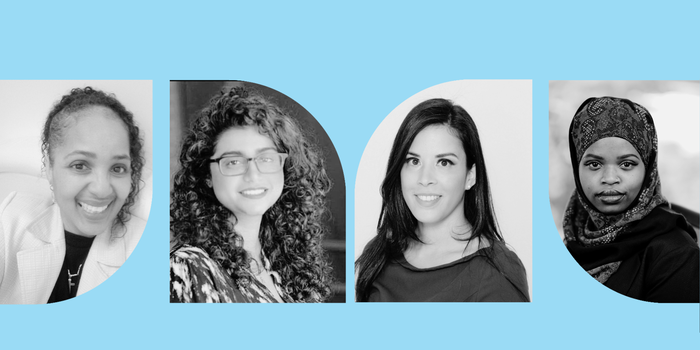
When Fabianna Rodriguez-Mercado was working in social media marketing, she realized that many of her clients also needed technical support. Unfortunately, she didn’t have the skills to help them. Providing that service would require going back to school, which wasn’t an option for financial reasons.
“It was very important for me to get started in technology in whatever shape and form that meant, but not get in debt,” says Rodriguez-Mercado, a Puerto Rico native with a background in business and marketing.
Enter Per Scholas, a New York-based nonprofit that offers free boot camp-style training courses including IT support, cybersecurity, software engineering, and other topics, as well as career and job-search support. The organization’s mission is to provide equitable training to those who are often excluded from tech careers, including women and people of color. The overall goal is to create a more diverse workforce. And it’s succeeding: about a third of the program’s 20,000-plus graduates are women, and 85% are people of color.
In 2018, Rodriguez-Mercado applied for and was accepted to take Per Scholas’ tech support program. Since then, she’s completed three more certifications, including one focusing on cybersecurity. Now, Rodriguez-Mercado combines her previous background with her tech training in her role as SVP, Chief of Staff of CISCO Cyber Security Services at Citi, where she supports managers that oversee data security and application development.
“Tech is an industry that’s evolving and will continue evolving,” Rodriguez-Mercado says. “We need more women and underrepresented communities to be part of these conversations.”
Rodriguez-Mercado’s successful pivot to tech exemplifies the impact of Per Scholas, which offers programs in dozens of cities across the country, including Dallas, Los Angeles, Minneapolis, and Atlanta (as well as virtual options).
Helping women achieve their goals
Anita Bailey was “desperate for a change” when she was accepted into Per Scholas’ IT courses in October 2012. She always loved computers but was working an administrative job and couldn’t afford to take time off to go to school.
She knew the CompTIA A+ certification—which focuses on IT support—would be hard work, but it was worth the commitment for the opportunities it would open up for her. (Classes take place Monday through Friday from 9 a.m. to 4 p.m. EDT for about 15 weeks.) After graduating, Per Scholas helped Bailey land multiple jobs in the tech industry. Today, she’s come full circle, working at Per Scholas as a senior associate of the IT service desk.
“The organization has really allowed me to take my interest in computer technology and turn it into a professional career,” she says.
Misty Branch is another Per Scholas graduate who wanted to switch careers. She double majored in psychology and African studies and was working on a Ph.D., but decided that wasn’t the right path. In 2020, at the height of the pandemic, she quit her Ph.D. program and was accepted into Per Scholas’ cybersecurity training shortly after having her first child. Her course was remote, which worked well for her as a new mom.
“My goal is to have a career that doesn’t take my time away from my family,” says Branch, who, like Bailey, currently works at Per Scholas (in its New Jersey campus) as a cybersecurity teaching fellow, where she helps educate new cohorts of adult learners.
Providing job search and career support
The benefits of Per Scholas’ courses go beyond learning technical skills. According to Rodriguez-Mercado, she also walked away with soft skills like communication, project management, and more confidence in herself, which are key when building a new career in tech.
The help doesn’t end when learners complete their certifications. Per Scholas also provides them with caseworkers to work through personal issues, financial coaches for budgeting advice, and career coaches to assist with searching and applying for jobs. And the organization partners with companies looking for entry-level tech candidates, so learners can have jobs lined up once they graduate.
“It’s a holistic approach to helping you excel,” Branch says.
The promise of full-scale support is what inspired Rumana Syed to apply for the cybersecurity course in 2020, when she was wrapping up her master’s degree and struggling to find a job. Career coaches helped Syed streamline her job search, write and proofread her resume, and practice job interviews. She also learned how to pitch herself to potential employers and negotiate a salary, as well as better communication and financial skills, such as building a credit score.
“I didn’t have a lot of experience. Per Scholas removed my fear of asking questions and helped me jumpstart my career,” says Syed, who currently works in cybersecurity at TikTok.
Building a community of women in tech
Beyond the tech training, support, and career advice, Rodriguez-Mercado says attending Per Scholas connected her to an encouraging, accepting group of peers.
“There is a whole Per Scholas community that believes in the learners before the learners can believe in themselves,” she says. “They’re there to encourage them, and introduce them to alumni and to opportunities.”
When she graduated, Rodriguez-Mercado wanted to give back to the organization and got involved with Per Scholas. She contributes by recruiting alumni to share their experiences with learners, reviewing resumes, and conducting mock job interviews.
As a Per Scholas staff member, Bailey is grateful she can help support women entering the tech field. “I always want to encourage other minority women that you can do this,” she says. “You can be an adult learner and make a career change. There are going to be challenges along the way, but don’t be afraid to do it.”
As someone who completed the program and now teaches courses at Per Scholas, Branch agrees. “It’s important for women to feel included in areas where we don’t see ourselves. We not only show women occupying those places, but also give them the resources to be there as well,” she says.